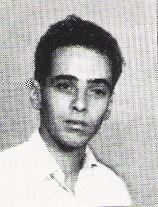 I was born in Los Angeles in 1928 and from the age of 13 I was a member of Habonim and participated in all the activities of the Movement. I was influenced a great deal by all these special teachings – Socialism and Zionism. At the end of World War II (where I served in the US Merchant Marines) I went to our training farm in Cream Ridge, New Jersey, where I stayed for one year – 1945. I decided that it was time for me to go to Palestine and I signed up, once again to the Merchant Marines in order to get on a ship that was destined for Palestine. These plans were disturbed when I was requested by the Haganah to work on one of the ships that were to take refugees from Europe to Palestine.
I was born in Los Angeles in 1928 and from the age of 13 I was a member of Habonim and participated in all the activities of the Movement. I was influenced a great deal by all these special teachings – Socialism and Zionism. At the end of World War II (where I served in the US Merchant Marines) I went to our training farm in Cream Ridge, New Jersey, where I stayed for one year – 1945. I decided that it was time for me to go to Palestine and I signed up, once again to the Merchant Marines in order to get on a ship that was destined for Palestine. These plans were disturbed when I was requested by the Haganah to work on one of the ships that were to take refugees from Europe to Palestine.
After waiting for one month I was recruited in 1946 to the Norsyd, a Canadian corvette (which was originally a mine-sweeper) which had accommodations for approximately 75 sailors. We sailed under the Panamanian flag. After preparing the ship, now called the “Haganah”, we sailed for Marseilles. Thee we removed all military equipment and refitted all available space with wooden bunks to accommodate the refugees and also built a new kitchen and dining room. From Marseilles we sailed to the port of Sete, France, where 1,000 refugees were waiting to get on the ship. We sailed for 5 days. The conditions were very difficult…so many people in so little space. Because of the additional weight the ship could not possibly keep on keel, and therefore many of the refugees were very seasick. We came to 50 km from the shores of Haifa, and there in the middle of the sea we transferred all the people onto two big lifeboats, and from there to a small Greek shop which was named the “Birya”. It took the ship approximately three days to reach the shore of Haifa.
We returned with the Norsyd to a small island not far from Piraeus, Greece, where we refueled and proceeded to Split, Yugoslavia, and took on a pilot who guided us through the Yugoslavian islands to the small port of Bakar, Yugoslavia. On that first night in Bakar some of the pipes of the ship’s boiler blew up. The Yugoslavians were so adamant to “get rid” of the refugees that were waiting to board the ship that they sent for people from the Naval Academy in that city to come to repair the damage. We were very lucky that there was that service for us. Within 24 hours the boiler was fixed and the refugees were brought to the ship in box-cars. The danger was so great that we thought of taking the ship back to Italy and leaving some of the refugees thee. Since that was not possible, we sailed straight to Haifa without any intentions of trying to disembark on some shore because of the lack of balance of the ship, with the huge overload we had on board.
We sailed for five days and the night before reaching Haifa we ran out of fuel. The Greek had sold us fuel mixed with water. That same night we met British warships and asked for their help but they refused and sailed away from us. We then broken up the wooden beds of the refugees for fuel and continued our journey to Haifa. We reached the breakwater of Haifa and the British were waiting for us. In order to make it more difficult for them to send us back to Europe, we released all the steam in the boilers. They tugged the ship and distributed the refugees to other illegal ships that were tied to the breakwater. The refugees were taken the next day to the detention camp of Atlit and we, the Americans and Canadians, were smuggled out of the port. We were dressed – some of us as doctors and others as port workers, and were taken out.
After having some food and drink I was taken to a small photography shop on the Hadar of Haifa and was issued within two hours an official British stamped Identity Card on which my new Hebrew name was printed. I then became a founding member of kibbutz Ma’ayan Baruch where I live today.
Source: Written by Raphael Banai for the Palyam website (www.palyam.org)

